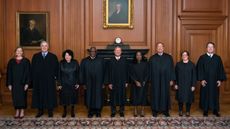More cities are banning sledding, thanks to lawsuits


With much of the U.S. bracing for snow and arctic temperatures this week, Dubuque, Iowa, is becoming the latest in a string of U.S. cities to ban or sharply limit sledding in public parks. The reason? Liability. The Dubuque City Council points to some large court losses in the past 10 years, like the 5-year-old girl who won a $2 million judgment against Omaha, Nebraska, after a paralyzing sledding accident, or the man in Sioux City, Iowa, who got $2.75 million from the city after injuring his spine by sledding into a sign.
Some cities are only banning sledding on certain hills, or posting signs warning people that they sled at their own risk. But banning sledding entirely offers greater legal protection, The Associated Press says. Not that enforcing bans is easy: Omaha, for example, now pads signposts and puts hay bales around trees to protect sledders from themselves, after people routinely ignored a ban on a popular sledding hill.
Municipal sledding prohibitions are not popular, for obvious reasons. But sledding advocates like Steve King say they are understandable. "We live in a lawsuit-happy society," he tells AP, "and cities are just being protective by banning sledding in areas that pose a risk for injury or death." Sorry, kids.
Subscribe to The Week
Escape your echo chamber. Get the facts behind the news, plus analysis from multiple perspectives.

Sign up for The Week's Free Newsletters
From our morning news briefing to a weekly Good News Newsletter, get the best of The Week delivered directly to your inbox.
From our morning news briefing to a weekly Good News Newsletter, get the best of The Week delivered directly to your inbox.
Create an account with the same email registered to your subscription to unlock access.
Sign up for Today's Best Articles in your inbox
A free daily email with the biggest news stories of the day – and the best features from TheWeek.com
Peter has worked as a news and culture writer and editor at The Week since the site's launch in 2008. He covers politics, world affairs, religion and cultural currents. His journalism career began as a copy editor at a financial newswire and has included editorial positions at The New York Times Magazine, Facts on File, and Oregon State University.
-
 'Make legal immigration a more plausible option'
'Make legal immigration a more plausible option'Instant Opinion Opinion, comment and editorials of the day
By Harold Maass, The Week US Published
-
 LA-to-Las Vegas high-speed rail line breaks ground
LA-to-Las Vegas high-speed rail line breaks groundSpeed Read The railway will be ready as soon as 2028
By Peter Weber, The Week US Published
-
 Israel's military intelligence chief resigns
Israel's military intelligence chief resignsSpeed Read Maj. Gen. Aharon Haliva is the first leader to quit for failing to prevent the Hamas attack in October
By Justin Klawans, The Week US Published
-
 ATF finalizes rule to close 'gun show loophole'
ATF finalizes rule to close 'gun show loophole'Speed Read Biden moves to expand background checks for gun buyers
By Peter Weber, The Week US Published
-
 Hong Kong passes tough new security law
Hong Kong passes tough new security lawSpeed Read It will allow the government to further suppress all forms of dissent
By Peter Weber, The Week US Published
-
 France enshrines abortion rights in constitution
France enshrines abortion rights in constitutionspeed read It became the first country to make abortion a constitutional right
By Peter Weber, The Week US Published
-
 Texas executes man despite contested evidence
Texas executes man despite contested evidenceSpeed Read Texas rejected calls for a rehearing of Ivan Cantu's case amid recanted testimony and allegations of suppressed exculpatory evidence
By Peter Weber, The Week US Published
-
 Supreme Court wary of state social media regulations
Supreme Court wary of state social media regulationsSpeed Read A majority of justices appeared skeptical that Texas and Florida were lawfully protecting the free speech rights of users
By Peter Weber, The Week US Published
-
 Greece legalizes same-sex marriage
Greece legalizes same-sex marriageSpeed Read Greece becomes the first Orthodox Christian country to enshrine marriage equality in law
By Peter Weber, The Week US Published
-
 Trump and his lawyer Alina Habba have a rough day in defamation court
Trump and his lawyer Alina Habba have a rough day in defamation courtSpeed Read Trump's audible grousing as E. Jean Carroll testified earned him a warning he could be thrown out of court, and Habba showed she 'doesn't know what the hell she's doing'
By Peter Weber, The Week US Published
-
 Anders Breivik to testify in prison isolation lawsuit against Norway
Anders Breivik to testify in prison isolation lawsuit against NorwaySpeed Read Far-right fanatic who killed 77 people in 2011 claims he has received 'inhuman treatment' in custody
By The Week UK Published